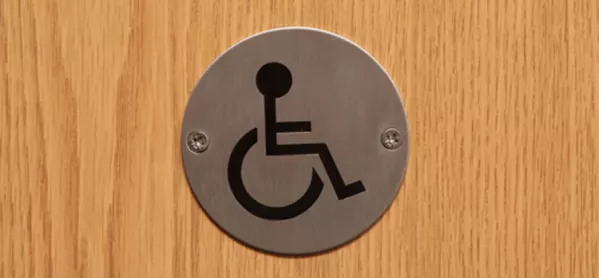The toilet is often considered the most mundane of spaces. Yet, for disabled children, school toilets can take on huge significance and may reinforce feelings of being different, inconvenient or unwelcome. This is an issue that schools need to address.
I am part of a project called Around the Toilet, in which we’re thinking about gender and disability to ask what makes a safe and accessible toilet space. Disabled pupils often don’t have access to the same toilet space as their peers and must instead use a separate accessible toilet. Disabled people have told us that this separation creates feelings of “difference”.
Moreover, the use of the iconic wheelchair-user symbol means that pupils with invisible impairments may have experienced scorn or even been told off for using the accessible loo by someone deeming them not to be “disabled enough”.
Lack of options
And that is, of course, when a suitable toilet is available: many find that accessible toilets aren’t accessible enough, particularly those requiring a hoist or adult changing bench.
Inaccessible, separated, non-existent, or “policed” toilets teach disabled people several messages, according to the participants of our workshops:
- You are different;
- You are an inconvenience;
- You are not welcome here.
These are clearly not messages that schools want to communicate to disabled students. However, there are some simple steps that can help to prevent this.
Our participants suggested that toilet doors should simply indicate what facilities are available (urinals, sanitary bins, handrails, etc), rather than who is welcome (men, women, disabled people). This would prevent accusations of being in the “wrong” toilet. They also suggested that there should be a much greater range of facilities available: from providing shelves to assist in changing colostomy bags, to avoiding strip lighting and noisy hand driers.
It was also raised that the toilet is often the only “private” space that children have access to in school and that providing other private spaces could help all pupils. This could be particularly important for those who require adult assistance to use the toilet, and so do not get that privacy.
Teachers have to remember that while the humble school loo may seem straightforward, for disabled pupils, it can be anything but.
Dr Jenny Slater is senior lecturer in education and disability studies at Sheffield Hallam University
Around the Toilet is hoping to do more work with schools involving their toilet spaces in the future. If your school would be interested to take part, contact: j.slater@shu.ac.uk
Find out more on the project blog, aroundthetoilet.wordpress.com or on Twitter @cctoilettalk
Want to keep up with the latest education news and opinion? Follow TES on Twitter and like TES on Facebook

